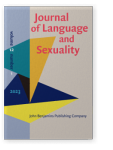Vol. 12:1 (2023) ► pp.98–134
“You know she didn’t have no country”
Codeswitching and performing sass on RuPaul’s Drag Race
This study focuses on switches into and out of African American English among contestants of the television series RuPaul’s Drag Race. Following Barrett (1995), I note that Black contestants who are comfortable in White Middle-Class American English tend to use it as their primary dialect, switching to AAE in order to develop rapport. I suggest that non-Black performers switch into AAE either in order to mitigate the effects of comments which might otherwise be interpreted as rude, or to reinforce strength in moments of emotional self-disclosure, and that this is possibly reflective of an interpretation on the part of the speaker that forwardness and strength constitute a normal element – ‘sass’ – of Black women’s speech. Finally, I explore the possible social impact of this phenomenon from the perspective of two common themes in the popular discourse on race: one centered on cultural appropriation, the other on the perception of Black Women’s Language.
Article outline
- 1.Introduction
- 2.Methodology
- 3.Data
- 3.1AAE as ‘performing sass’
- 3.2Other functions: Gossip, front-stage humor and building rapport
- 4.Analysis
- 4.1‘Performing sass’, ‘realness’, and cultural appropriation
- 4.2AAE in drag and normative views of Black womanhood
- 5.Conclusion
- Notes
-
References
